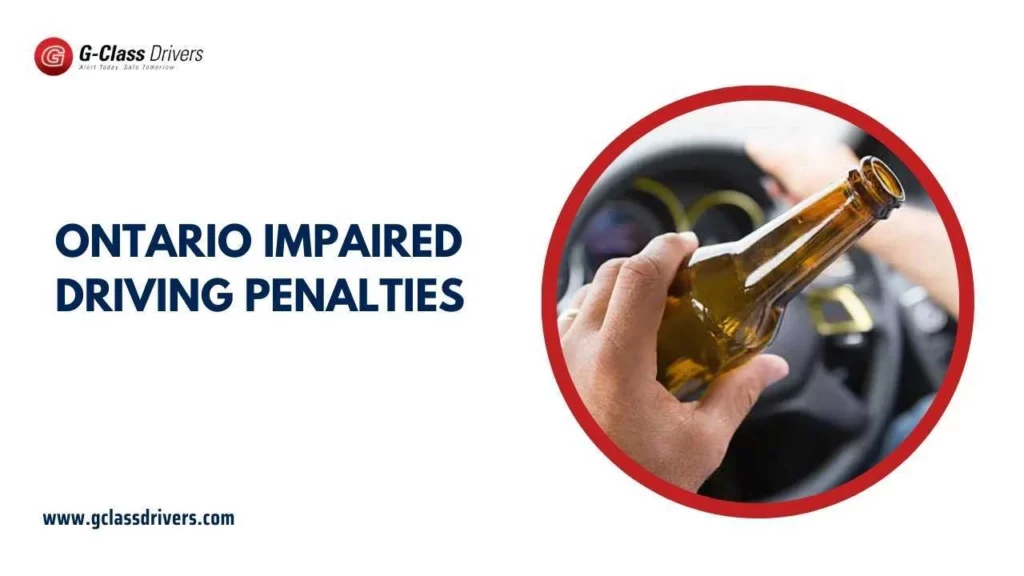Impaired driving is one of the main factors in the serious road crashes happening in Canada. From the survey of past years, almost 12,000 people have died in crashes due to impaired drivers. According to the record on marijuana use and driving, 16.6% of badly injured drivers in Canada tested positive for cannabis.
To help in addressing impaired driving, CCSA conducts research, creates tools and plans, and produces targeted materials to help evidence-based decisions and public policy which is related to Ontario’s impaired driving penalties.
What is Impaired Driving?
Impaired driving occurs when someone drives a vehicle while impaired by materials like cannabis, illegal medications, over-the-counter (OTC) medicine, prescription drugs, and illegal things.
Ontario laws for impaired driving include the use of vehicles, such as cars, trucks, buses, boats, off-road vehicles, and snowmobiles. Ontario impaired driving penalties can be helpful for drivers to take the right precautions.
Ontario Impaired Driving Penalties:
If you are stopped by a police officer and suspected of impaired driving, you might have to deal with some penalties. and these penalties include:
- Quick license rejection.
- Vehicle in custody.
- Charges and recovery fees for the rejected license.
- Completion of education & training programs.
- Facing more penalties depending on convictions.
Drinking and driving fines in Ontario can depend on the situation, and the penalty for DUI in Ontario Canada, can also increase if the offense is repeated.
Let’s discuss in detail about what these penalties are and their offenses. We have listed all of these penalties down below:
Warn Range Penalties:
If your BAC is between 0.05-0.079, or you decline the roadside test, you will face the following penalties under Ontario impaired driving penalties:
| 1st Time Offense: | 2nd Time Offense: | 3rd Time Offense: |
|
|
|
|
|
|
|
|
|
|
It is important to be aware that you have to pay a license recovery fee at every time when the license is rejected.
Impairment Penalties:
If the BAC is more than 0.08% or declines from the roadside test, you will face the following penalties:
| 1st Time Offense: | 2nd Time Offense: | 3rd Time Offense: |
|
|
|
|
|
|
|
|
|
|
|
|
|
Other Penalties For Criminal Impaired Driving Charges:
It doesn’t matter about the age or license you have, if you are found guilty of impaired driving in court, you can face more charges and more prison time.
| 1st Time Offense: | 2nd Time Offense Between 10 Years: | 3rd Time Offense Between 10 Years:: | 4th Time Offense Between 10 Years:: |
|
|
|
|
|
|
|
|
|
|
|
|
|
Penalties For Teenage and Beginner Drivers:
For drivers that are under the age of 21 or still have G1, G2, M1, or M2 licenses, according to Ontario laws it is illegal to have any drugs, or alcohol in their vehicles. Penalties include:
| 1st Time Offense: | 2nd Time Offense: | 3rd Time Offense: |
|
|
|
|
|
|
|
|
|
|
|
|
|
Consequences of Impaired Driving Charges:
The consequences of impaired driving can affect your personal and social life also, these include:
- Criminal Record: A conviction for impaired driving has an outcome to a criminal record that can affect job chances and traveling plans.
- Expanded Insurance Rates: Charged of impaired driving makes you a high-risk driver, which leads to higher insurance rates.
- Prison Time: It depends on the strictness and conditions that are included in the charge (e.g., injury or death), according to the charge, prison time can be applied.
Preventing Impaired Driving:
It is important to educate yourself about what is impaired driving and know all the risks that are included while drinking and driving under the influence in Ontario, with this you can make a good decision for your safety as well as for others who are on the road.
- Attend Classes: Many associations offer classes on safe driving practices and the risks of impaired driving.
- Use Assets from MADD Canada (Mothers Against Drunk Driving): MADD offers detailed information on the prevention procedures for impaired driving and support to victims.
- Attend Community Programs: Attending local programs will help in the decrease of impaired driving and also encourage awareness and responsibility.
Summary:
Understanding the Ontario impaired driving penalties is essential for everyone who drives in this area. The penalties, that include fines and license suspensions to jail and criminal records, are made to block impaired driving and develop safety on the road. By knowing the risks of driving under the influence in Ontario, drivers can make logical decisions that will protect their safety as well as for the others that are on the road.
At G-Class Drivers, we offer many educational driving courses especially created to give advanced knowledge to the new drivers about the risks and safety strategies to prevent impaired driving.
FAQs:
What does impaired mean in a car?
Impaired driving is dangerous. It’s the cause of more than half of all car crashes. It means operating a motor vehicle while you are affected by: Alcohol. Legal or illegal drugs.
What happens when you get a DUI for the first time in Ontario?
The minimum penalty for a DUI charge in Ontario is a fine of at least $1,000 for a first offense and a mandatory license suspension for 1+ years.
Is jail time mandatory for 2nd driving under the influence (DUI) in Ontario?
Any driver with a second DUI within 5 to 10 years of the first DUI faces an automatic suspension of license for 1 year or longer. Upon conviction, the offender faces a mandatory jail term of 90 days to 6 months on average.
Can I go to Canada if I have 2 DUI?
If you have two or more drunk driving violations or other excludable criminal convictions on your record, you will likely never be deemed rehabilitated by virtue of time and may be refused entry at the Canadian border without a Temporary Resident Permit or Criminal Rehabilitation even 20+ years later.
Can you fly to Canada after DUI?
who have a DUI conviction, the only way to get into Canada is to fly into the U.S. and then drive to the Canadian border with a Temporary Resident Permit. Additionally, Canada has front-line access to the National Crime Information Center database, which makes American offenses easier for border agents to detect.





